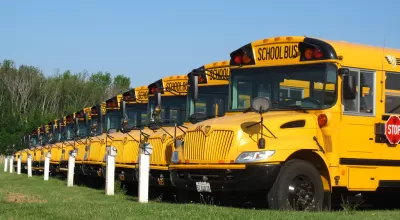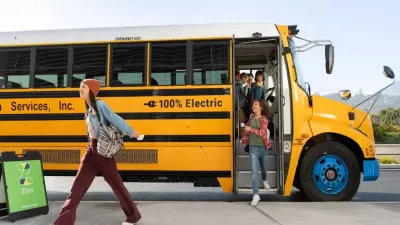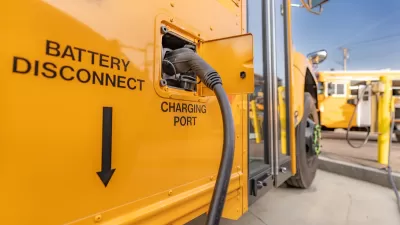Greening school buses, which represent the bulk of America's mass transit, would reduce children's exposure to harmful diesel emissions and remove millions of tons of greenhouse gas emissions from our roads.

Despite evidence that Americans strongly support the electrification of school buses, writes Kea Wilson, "Congress keeps whittling down funding for this common-sense, bipartisan priority." Although President Biden included $20 billion for school bus electrification in the American Jobs Plan, this funding has dwindled as Congress continued to debate the plan, down to only $7.5 billion for bus electrification in the most recent draft. "Advocates say the cuts are unacceptable, especially given growing support for zero-emission fleets."
School buses aren’t always a focus of sustainable transportation advocates, but they actually represent the largest segment of America’s mass-transit system, outnumbering city-transit vehicles by more than three to one and outpacing mass transit’s annual trip volumes by roughly a million journeys every year. But because 95 percent of school buses run on diesel, the 20 million U.S. children who use them are exposed to emissions daily that have proven harmful to respiratory health and brain development.
These impacts, like so many other things, disproportionately affect children of color and low-income families. "Those obstructions are even more unacceptable given the U.S.'s growing dependence on automobiles, which forces more and more children to give up walking or biking to school every year. But as children from wealthier families are piled into cars, low-income kids are more likely to be shifted onto buses, further concentrating the health effects of diesel pollution into poor and BIPOC school districts."
According to Paul Billings of the American Lung Association, "[s]chool buses are particularly ubiquitous in U.S. communities, and that means they have a lot of potential to help the public understand the advantages of this transition. But then we need to do it with urban transit, too — because the public health impacts are exactly the same."
FULL STORY: Americans Want Green School Buses, But Congress Sells Them Short

Planetizen Federal Action Tracker
A weekly monitor of how Trump’s orders and actions are impacting planners and planning in America.

Map: Where Senate Republicans Want to Sell Your Public Lands
For public land advocates, the Senate Republicans’ proposal to sell millions of acres of public land in the West is “the biggest fight of their careers.”

Restaurant Patios Were a Pandemic Win — Why Were They so Hard to Keep?
Social distancing requirements and changes in travel patterns prompted cities to pilot new uses for street and sidewalk space. Then it got complicated.

Platform Pilsner: Vancouver Transit Agency Releases... a Beer?
TransLink will receive a portion of every sale of the four-pack.

Toronto Weighs Cheaper Transit, Parking Hikes for Major Events
Special event rates would take effect during large festivals, sports games and concerts to ‘discourage driving, manage congestion and free up space for transit.”

Berlin to Consider Car-Free Zone Larger Than Manhattan
The area bound by the 22-mile Ringbahn would still allow 12 uses of a private automobile per year per person, and several other exemptions.
Urban Design for Planners 1: Software Tools
This six-course series explores essential urban design concepts using open source software and equips planners with the tools they need to participate fully in the urban design process.
Planning for Universal Design
Learn the tools for implementing Universal Design in planning regulations.
Heyer Gruel & Associates PA
JM Goldson LLC
Custer County Colorado
City of Camden Redevelopment Agency
City of Astoria
Transportation Research & Education Center (TREC) at Portland State University
Camden Redevelopment Agency
City of Claremont
Municipality of Princeton (NJ)





























